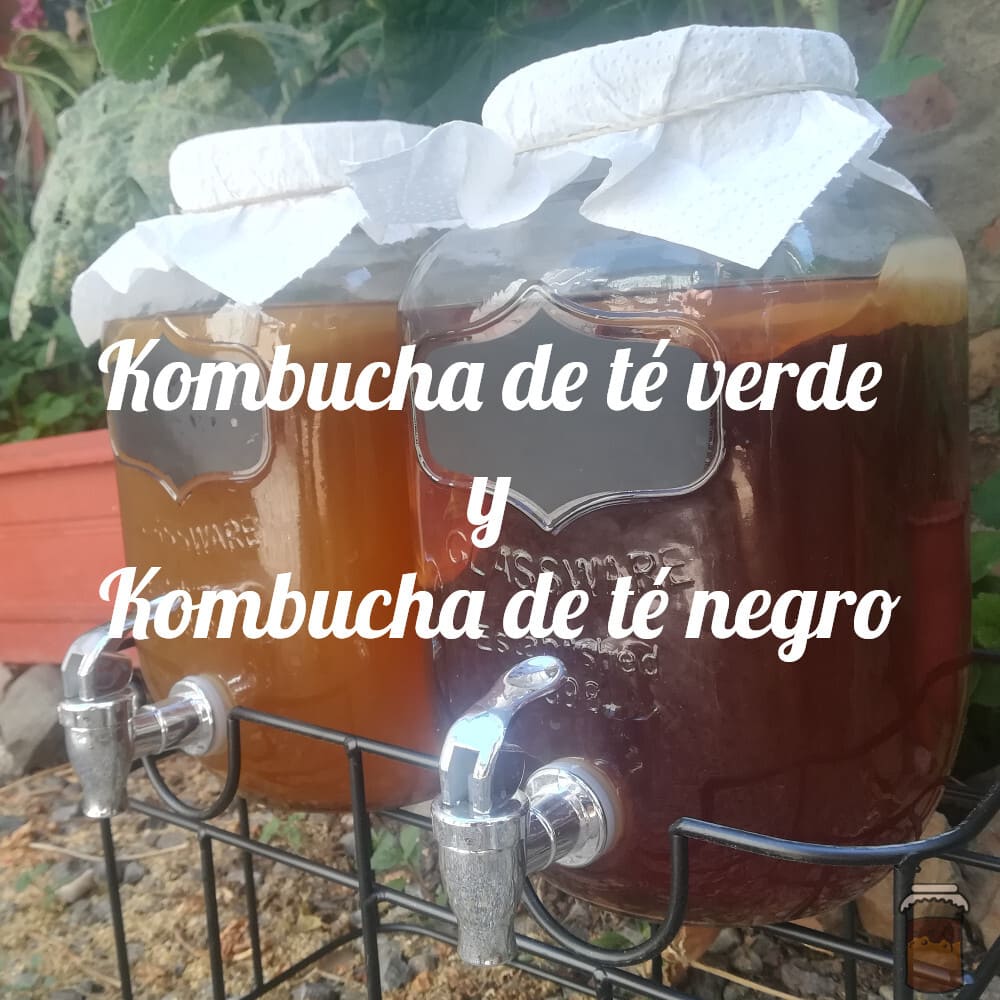Kombucha drinks combined with black or green tea have been noted for their health-promoting properties, where, although both show several benefits that are similar, in some cases the use of one is more effective than the other.
And these differences that may exist are produced by the differences that exist between green tea and black tea, since kombucha inherits and enhances the properties of both teas.
Green tea has a better stimulating effect on kombucha fermentation compared to black tea, generating the desired product in less time. But also the antioxidant and antimicrobial properties of both products are different, and we will analyze it in the following sections.
Which has the best antioxidant capacity?
Kombucha prepared from green tea is characterized by having the highest antioxidant potential. This is due to its higher content of catechins with a more potent effect against oxidative stress compared to black tea. [1]
The main protective effect of tea is due to its content in polyphenols, highlighting catechins and flavonoids, which help maintain the integrity of tissues throughout the body. [2]
Several studies have shown that the strong antioxidant properties of green tea are attributed to the presence of the catechins epigallocatechin gallate (EGCG) and epigallocatechin (EGC), very potent antioxidants compared to the theaflavins and thearubigins in black tea. [3]
If green tea is used as a base to prepare kombucha it can further enhance its antioxidant properties. [1]
Who has better antimicrobial capacity?
Several studies found that green tea kombucha has a higher antimicrobial capacity than kombucha prepared from black tea. This is because the EGCG and ECG catechins of green tea have antibacterial activity against both some Gram positive (+) and Gram negative (-). [3] [4] [5]
Unlike black tea which shows a narrower and less lethal antimicrobial spectrum.
Black tea in high concentrations could have a bactericidal effect on dental pathogenic microorganisms but its capacity is even lower than that of green tea. [4]
In several studies it was found that black tea kombucha is able to inhibit pathogens such as Shigella sonnei, Escherichia coli, Salmonella enteritidis and Salmonella typhimurium. While green tea was shown to inhibit the growth of M. luteus, S. aureus and B. cereus, where M. Luteus the most sensitive. [3]
Kombucha exhibits antimicrobial activity due to acetic acid produced during fermentation. And in one study it was observed that green tea was characterized by having the highest content of acetic acid compared to black tea and other fermented tea drinks. [3]
Also green tea kombucha showed a greater thermostability of its components unlike black tea kombucha. [4] [5]
What are its effects against cardiovascular diseases?
What you will see next is oriented to the investigation of tea and not kombucha itself due to the lack of scientific information, but we consider it, since being the substrate of kombucha, the properties are inherited and increased in fermentation as we saw in the previous section.
Both teams are able to control several pathological mechanisms that can predispose the appearance of cardiovascular diseases, such as hypolipidemic activity, antioxidant capacity, LDL protection against oxidation, among others. [6] [7]
In several studies it was shown that black tea decreases the risk of cardiovascular diseases, this also by controlling the levels of triglycerides, polyphenols, and blood pressure.
It was found that drinking black tea regularly significantly decreased cardiovascular diseases, drinking 3 or 6 cups a day improved the antioxidant status of the body, although if that limit is exceeded it can be dangerous. [6]
Also, black tea reduces low-density lipoprotein cholesterol levels in people with hypercholesterolemia. [8] [9]
In studies with hamsters it was found that the hypolipidemic effect of green tea is not due to cholesterol reduction or fatty acid synthesis, so it is considered that the decrease in cholesterol is due to absorption. It has not been determined whether a similar mechanism occurs in humans. [7]
Green tea catechins also exert vascular protective effects through multiple antioxidants, antihypertensive, anti-inflammatory, antiproliferative, antithrombogenic and lipid-lowering mechanisms. [10]
Can they help in body weight loss?
Black tea plays an important role in weight loss thanks to its content in polyphenols that increase lipolysis thus reducing the accumulation of fat in the tissues. These are more effective than green tea polyphenols. [11]
They also reduce the digestion, absorption and ingestion of lipids and complex carbohydrates, reducing calorie intake, in addition to suppressing the digestion of other nutrients. [11] [12]
Another point to mention of black tea is that by reducing oxidative stress it can block the pathological processes and comorbidity of obesity.
On the other hand, preparations with green tea generate a small weight loss statistically not significant in adults with overweight or obesity. They also seem to induce a small loss of weight and a reduced ability to maintain this loss over time. [13]
In this sense, weight loss seems to be more effective with black tea than green tea, since according to this research, although green tea has a higher concentration of polyphenols, these seem to be more potent in black tea.
What are its anti-cancer benefits?
The first thing I want to clarify is that by no means does the information below represent the solution to cancer. It’s a complicated topic and I’m just going to talk about the most relevant information mostly tested on animals or in the laboratory.
There is epidemiological data suggesting that tea consumption contributes to cancer prevention, but the difference between green and black tea in their anti-cancer properties has yet to be determined.
Theaflavins in black tea exert a chemoprotective action against tumors, can also regulate the growth and metastasis of cancer cells, in addition to increasing apoptosis (cell death) in these, according to observations made in rodents. [14]
It was shown that black tea leaves contain a series of bioactive components such as polyphenols, amino acids, volatile compounds, and alkaloids, which have the ability to control several diseases affecting several pathogenic mechanisms of these. [15]
Green tea works as a primary prevention of cancer by delaying its onset and decreasing its incidence, also the catechins of green tea in conjunction with cancer drugs could enhance its anticancer effects, acting as tertiary prevention of cancer. [16]
In this sense, green tea tends to take a greater role, especially because of the EGCG that we talk about in our section on antioxidant capacity, since it has been named in studies as an element that can help prevent the recurrence of breast cancer. [17]
It is also important to note that the amount of EGCG in kombucha prepared with green tea does not vary much compared to green tea as such, as this study shows. [18]
Can they help lower the risks of diabetes?
Both green tea and black tea show components with possible antidiabetic effects in people and have been linked to the clinical improvement of blood glucose levels.
Black tea lowers blood glucose levels, improves insulin sensitivity, improves the ability to metabolize sugar, tea catechins improve insulin status, and in some studies was shown to improve postprandial blood sugar levels in normal and prediabetic adults. [19] [20]
Some reports mention the benefits of tea catechins for controlling type 2 diabetes. Although, other studies have indicated that chronic consumption of green tea can lead to liver failure, neuronal damage, and exacerbation of diabetes. Therefore, the variations of the effect after the consumption of green tea are quite large. [21]
You can check out our dedicated post on whether diabetics can consume kombucha.
Again, I want to reiterate that most of thestudies cited are based on the consumption of tea and not kombucha, mostly in the sections related to diseases, and it was done this way due to lack of information.
We have reached the end of the article, so I hope I have been able to help you work out whether green tea kombucha or black tea is better, and that the answer is not black or white, but depends on the purpose, although green tea kombucha tends to be a little better. Don’t go away and keep informing about kombucha and other fermented foods.

